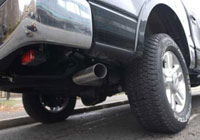France, Italy, Japan manufacture cleanest automobiles
The most environmentally friendly cars in Europe were made by France, Italy and Japan, according to the study.

The report, by an independent European group campaigning for cleaner modes of transport, said France's PSA Peugeot Citroen SA sold the lowest carbon dioxide-emitting fleet of cars in 2006. The company's cars emitted an average 142 grams of CO2 per kilometer.
Italy's Fiat SpA, which had a fleet average of 144 grams/kilometer, was No. 2 followed by France's Renault SA, with 147 grams, the report said.
Toyota Motor Corp., which is vying with U.S. giant General Motors Corp. for the title of world's largest automaker by sales this year, came in fourth with 153 grams, while its rival GM came in sixth, with 157 grams per kilometer.
Germany's BMW AG, the world's biggest maker of luxury cars, and DiamlerChrysler AG, now called Daimler AG, had the highest polluting cars last year according to the study, while other carmakers Ford Motor Co., Volkswagen AG and Honda Motor Co. ranked middle of the pack.
The report card was written up by the Brussels-based European Federation for Transport and Environment, which is pushing EU governments to adopt new rules to impose strict CO2 limits on the auto industry.
It said German car makers actually increased their CO emissions on new cars last year, by 0.6 percent on average.
"In contrast, French and Italian groups cut emissions by an average of 1.6 percent," the report said.
Jos Dings, director of the federation, said it was sad that German car manufacturers were trying to hold back EU efforts to come to new binding car pollution limits to meet European global emissions cuts promises.
"Germany's fine automotive engineers should be focusing on making cars leaner and more fuel efficient," Dings said. "Sadly, based on recent progress, they mostly seem to be intent on building ever heavier, larger and more gas guzzling cars that simply don't belong in the 21st century."
Dings called on car manufacturers that scored lower in the table to follow the lead of French and Italian car makers to reduce the weight of automobiles, which it said helps in cutting emissions.
"The failure to cut the weight of cars is one of the principal reasons why CO2 emissions and fuel consumption are not going down," he said.
The automobile industry has said it is working hard to introduce greener cars, but manufacturers from Europe, Japan and South Korea have said they are unlikely to meet a European target to reduce CO2 emissions to 140 grams per kilometer by the end of 2009.
Last month, the European Parliament under heavy pressure from the car industry proposed extending an EU deadline for car makers to develop more eco-friendly vehicles to 2015 from a proposed 2012.
The EU parliament, which would have to approve any final legislation, proposed setting the limit at no more than 125 grams per kilometer less than the European Commission's proposal of an 130-gram limit for car makers by 2012, but three years later. It argued the industry needs sufficient time to implement the required changes.
Efforts to make the 27-nation EU a global leader in cutting greenhouse gas emissions have become bogged down over the issue of forcing the region's carmakers to sell cleaner vehicles.
The plan to introduce binding rules to force carmakers to cut CO2 emissions faces opposition from the car industry, which says it puts at risk 12 million auto-sector jobs.
The study gathered its emissions statistics from various compiled national and EU sources on 14 top carmakers that sold over 200,000 vehicles in Europe in 2006. Data analysis was carried out by the independent Institute for European Environmental Policy in London.
Subscribe to Pravda.Ru Telegram channel, Facebook, RSS!


